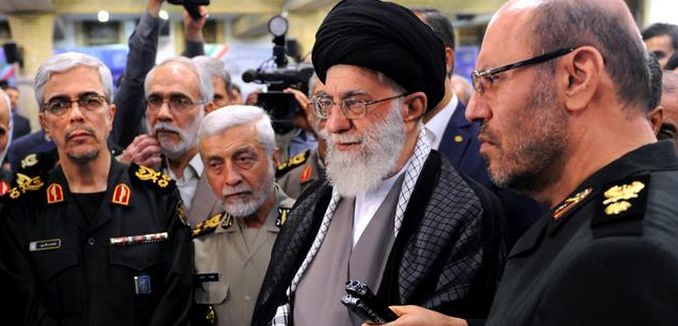Iranian Supreme Leader Ayatollah Ali Khamenei continued making incendiary remarks about the United States at a military exhibit this week, emphasizing that the Islamic Republic should boost its offensive capabilities and “avoid negotiating” with Washington, The Times of Israel reported on Thursday.
To preserve Iran’s future, “in addition to defensive capability, offensive capability should be also bolstered,” Khamenei said, according to Iranian media reports. “Iran’s defensive capability and power must be increased so that the bullying powers would feel threatened,” he continued.
In order to provide security of nation, country and future, offensive capabilities must be improved along with defense power as well.
— Khamenei.ir (@khamenei_ir) August 31, 2016
Khamenei added that “it is wrong to assume that common points and understanding can be worked out through negotiations” with Washington. “And that’s why I insist that [we] are required to avoid negotiating with the U.S., and experience has proven that instead of understanding, the Americans are seeking to impose their will in the negotiations, a conspicuous example of which was the recent developments,” he said.
Aside from the “manufacture of weapons of mass destruction (WMDs) such as nuclear and chemical weapons…there is no restriction in other fields for increasing our defense and military capabilities, and progress in these fields is a duty,” he added, possibly in response to the recent installation of the Russian-built S-300 surface-to-air missile system outside the Fordow nuclear enrichment facility.
He didn’t explain why Fordow, which is still described as a nuclear site by one of his generals, needed such a sophisticated defense, nor why German intelligence uncovered evidence that Iran was seeking technology to develop chemical weapons. He also didn’t elaborate as to whether he had communicated the prohibition on using those munitions to his ally, Syrian dictator Bashar al-Assad, whose regime’s use of chemical weapons against civilians has been extensively documented.
We have no restrictions in development of defense industry, except for WMDs such as nukes & chemical weapons which are banned by religion.
— Khamenei.ir (@khamenei_ir) August 31, 2016
Khamenei also claimed on Sunday that the installation of the S-300 system is not problematic because it is “defensive and not aggressive.” However, Patrick Megahan and Behnam Ben Taleblu of the Foundation for Defense of Democracies explained last year that while the S-300 system is called a defensive weapon, it “would allow Iran offensive capacities beyond its airspace, which could include harassing non-hostile aircraft flying over neighboring countries.”
Sen. Mark Kirk (R – Ill.) criticized the White House in a statement released Monday for “failing to enforce U.S. laws that mandate sanctions against countries that export destabilizing advanced conventional weapons to Iran.” Three separate U.S. laws call for sanctioning countries that sell destabilizing arms to Iran.
S-300 missile system is defensive & not aggressive, but Americans make any efforts to deprive the Islamic Republic of such a capability.
— Khamenei.ir (@khamenei_ir) August 28, 2016
Despite the nuclear deal reached last year, Khamenei has maintained a hostile stance to the U.S., calling it “criminal” in a video released last September. He ordered Iranian authorities to block the import of American goods in November, and accused the U.S. of attempting to subvert Iran by using “money and sexual attractions” later that month.
In January, he hailed the Iranian forces who seized ten American sailors and two boats as doing “God’s deed.” Two months later, he said that Iran hoped to have relations with all nations except for the U.S. and Israel. In May, he mocked President Barack Obama’s Nowruz message to the Iranian people and referred to the U.S. as the Islamic Republic’s “main enemy.”
[Photo: Fars News ]




